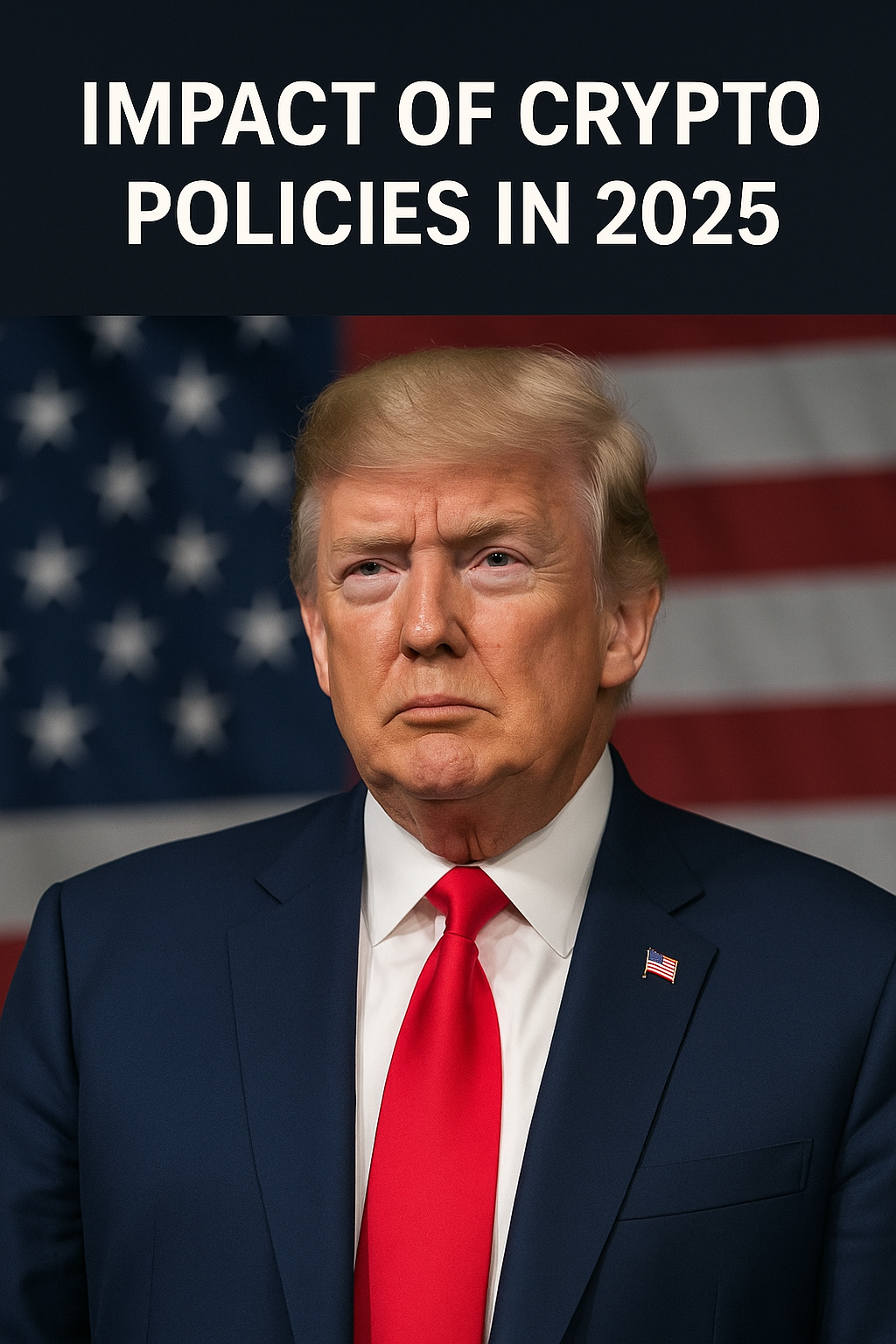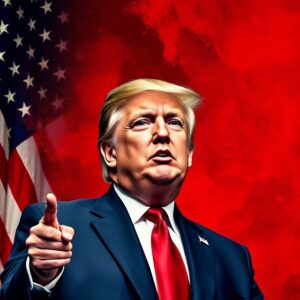By 2025, Bitcoin is not simply a digital experiment, but is an entrenched part of the global financial system.
Amid fears of inflation and central bank policy, and increasing uncertainty in established systems, more and more individuals are looking at Bitcoin as a store of value. Institutions, companies, and even countries are beginning to add Bitcoin to their coffers. It also has few physical barriers to upward movement and is much less controllable, which is particularly attractive at times of high uncertainty.
Trump’s Crypto Views Get Trumpier I guess.
Former President Donald Trump has called Bitcoin a scam and said he didn’t like it. But things have changed. While campaigning and shaping policy in his second term, Trump’s rhetoric is now more candid. In recent interviews and remarks, he has expressed interest in the role of crypto in protecting U.S. innovation, cutting away central bank power and even applying blockchain for transparency. His shifting position is sending ripples through political and crypto circles — and may set the direction for the future of digital currency in America.
Overview of This Guide
This guide will walk you through what Trump’s new role means for Bitcoin investors, the crypto market at large, and the U.S. economy in 2025. We will cover political influence, price reactions, regulation risks and expert views. If you like Trump or not, it is important to recognize his influence over Bitcoin’s next chapter. Let’s take a deeper look at the news and the future — and consider why Bitcoin may matter more than ever before in the coming years.
Trump’s Crypto Policies
Bitcoin-Supportive Executive Orders
Donald Trump signed clear executive orders in support of Bitcoin in his second term. These orders unraveled a lot of older clampdowns on crypto. He ordered U.S. agencies to treat Bitcoin as a “strategic digital asset,” not an adversary. Trump has argued that stifling crypto innovation will only accelerate its exodus. So his directives promote blockchain development inside the U.S. Meanwhile, the government has also begun to allow individual ownership of crypto wallets and assets. He also cautioned regulators not to restrict access to law-abiding citizens. These efforts seek to bring the world of crypto into the mainstream without stifling innovation.
Creation of the Strategic Bitcoin Reserve
One big step was the setting up of a Strategic Bitcoin Reserve — similar to how countries hold gold. This new reserve will help insulate the U.S. economy from the impact of inflation or financial shocks. Trump has ordered the Treasury to start stockpiling Bitcoin in strategic, intelligent stages. It involves a combination of tapping tax on cryptocurrencies and partnering with regulated businesses. It will give America the advantage in future global finance, his team says. This decision also sends a message that the U.S. is treating crypto as something serious, not just a tech fad, but as a national asset.
Aims to Forge the U.S. as a Crypto Leader
Trump has made it clear — he wants the US to be the lead in the world’s crypto innovation. His government will now give tax breaks to clean-energy crypto miners. It provides government grants to finance blockchain projects as well. Meanwhile, his policies allow digital asset banks to procure licenses at a quicker pace. Trump has frequently asserted that the U.S. is being outcompeted by countries including Switzerland and the UAE. He wants to change that. So his team is working on crafting a national crypto framework that can spur growth while protecting users.
He frequently uses phrases like “crypto freedom,” and “financial independence” for Americans. Whether it be politics or personal bias, says Matthew Graham, CEO of Sino Global Capital, that decision has shifted the way the US government talks about the existence of Bitcoin. Global markets are taking notice, and with these new policies.
Key Team Members’ Views
David Sacks: The ‘Crypto Czar’
David Sacks, a prominent tech investor who is a member of Trump’s 2025 economic team, has been jokingly derided as the “Crypto Czar.” He says Bitcoin and blockchain will define the next era of American innovation. To him, digital assets aren’t merely about finance — they’re about freedom, privacy, and freedom from old systems. Sacks supports the Strategic Bitcoin Reserve and would like to see the U.S. become the most secure and advanced place for crypto startups. He’s also at work building the sort of strong public-private partnerships in which tech companies and the government collaborate to create crypto-friendly tools and frameworks.
Paul Atkins: What the SEC Chair Thinks
Paul Atkins, currently the head of the U.S. Securities and Exchange Commission (SEC), has been far more gentle on cryptos than his predecessors. Rather than lumping every token into the same security bucket, Atkins has advocated for clear rules of the road to separate utility tokens from your classic investment asset. He thinks overregulation is killing innovation. Thus, under his watch, the SEC has signed off on a number of Bitcoin ETFs and is in the process of fast-tracking licenses for crypto companies that are on the level. He’s publicly said that Bitcoin is “here to stay” and has urged the SEC to spend more time protecting consumers from scams — not blocking access to real innovation.
What Other Advisors Are Saying About Bitcoin
The top economic and tech advisors to Trump now openly support Bitcoin. Personalities such as Peter Thiel, Vivek Ramaswamy, and Cathie Wood have lauded the administration’s pro-Bitcoin position. They say that the United States is an innovator and should lean into that and embrace crypto in order to gain the global financial upper hand. Some advisers are also drafting proposals to allow Americans to use Bitcoin for taxes, savings, and retirement accounts. Not everyone in Washington is on board, but Trump’s closest advisors are generally in the camp of viewing Bitcoin as an opportunity to modernize the economy and wean it off dependence on centralized systems.
Implication for The Crypto Market In 2025
Bitcoin Price Trends in 2025
The cryptocurrency market in 2025 is experiencing drastic changes, hastened in part by the rise of Bitcoin and evolving international regulations. It has recovered from a fall to about $76,000 earlier this year and was trading near $95,000. Many experts believe it could hit $120,000, or even $200,000, before 2021 is over. This bullish trend is supported by several strong factors, including increasing interest from institutions, approval of Bitcoin ETFs in the U.S., Bitcoin emerging as a safe asset during inflationary times, and a time of global uncertainty.
Trump’s Crypto Policies and How They Were Perceived by Investors
President Trump’s crypto-friendly stance is also helping to influence the market. His administration has issued executive orders supporting Bitcoin, floated a strategic Bitcoin reserve, and created a federal crypto task force. They have helped stimulate a wave of optimism among investors. But not everyone is so sure. Others are concerned about the overall lack of regulation and the connection to Trump businesses in crypto, which could open up ethical and legal lines of inquiry. Yet the general mood in the market has also been bullish, and individual as well as major investors have been more active.
World Reacts to U.S. Crypto Actions
Overseas, America’s bold stance on crypto is being met with equal doses of praise and criticism. In Europe, policymakers worry that U.S. crypto might disrupt their own digital currency plans. Other Asian nations as well, such as India, are reconsidering their regulatory regimes as they try to balance new technologies and financial safety. At the same time, jurisdictions like Dubai are going all in on crypto and are becoming future hubs for blockchain tech. Developmental countries, like Pakistan, are even toying with the idea of tapping excess electricity for Bitcoin mining and finding ways in which crypto can help economies expand. Collectively, these factors are set to make 2025 through the most pivotal year for the worldwide crypto space.
Regulatory Changes in 2025
Regulations Impacting Businesses in Crypto
By 2025, regulations focusing on the cryptocurrency sector have crystallized and tightened in most areas. The U.S. has issued prescriptive guidelines that divide crypto companies into buckets like exchanges, wallets, and token issuers — with slightly different sets of rules for each. These regulations are intended to stop the flow of illicit cash and enhance investor protection, but they also place added operational burdens on start-ups and smaller companies. Today, licensing is generally required for most crypto services and know your customer (KYC) policy has been enforced rigorously. This pattern is mirrored in Europe, which is about to enact the EU’s MiCA regulation.
Taxation Changes for Crypto Assets
The rules of taxation for crypto are closing worldwide. In the U.S., all transactions over $600 are now reportable, and crypto-to-crypto trades are considered taxable events. There still are long-term capital gains taxes, but the policing is far stricter than it had been in previous years. Some countries have gone farther, taxing large holdings of crypto using wealth taxes. In the meantime, a handful of crypto-friendly jurisdictions such as Portugal and the UAE still provide tax benefits, as they have become popular destinations for digital asset investors and companies. But most governments are at the moment all about making it as transparent as possible and closing up the loopholes when it comes to crypto tax reporting.
Enabling the Blockchain Technology Revolution with Innovation Support
Governments are actually helping to push forward blockchain development, despite the tighter regulations. The U.S. has unveiled federal grants and public-private partnerships in aid of research in decentralized finance (DeFi), digital identity verification, and smart contracts. The technology is also being adopted to track land records, health care, and supply chain, among other public services. European countries are financing pilot projects for transactions between countries with blockchain. Blockchain is even being explored for voting, education records, and financial inclusion — in Asia and Africa, too. So, if the regulatory net is closing, there’s a simultaneous push to bolster the core technology that turns digital assets into crypto.
What Do You Think Life Will Be Like for Crypto in 2025?
“As people like myself leave and move on to do more meaningful, impactful work, the culture of crypto will grow up, driven by people at the cutting edge of defining the future for the world that we all live in.” – Pete, who left the space in 2021
Public Perceptions of Some of the Smartest People Expanding How Others Perceive Our World: “Crypto will obsolete money, but until then we will have crypto, stock, gold, bonds, real estate, etc.”
Cheering Trump’s Plan for Crypto: Supporters Applaud Trump’s View
A number of the president’s opponents in the technology business and the crypto community welcomed his pro-crypto views during a second term. They like his work to roll back regulatory hurdles and nudge Bitcoin into the big leagues at the federal level. His supporters maintain that the president’s policies are helping to put the United States in a position as a global hub of blockchain technology. His plan for a Strategic Bitcoin Reserve and the advisers who are crypto-savvy on his team have given a fillip to investors. For them, the current administration is a once-in-a-generation conflation of government support and free-market experimentation in digital assets.
Concerns of Critics on Market Stability
Critics, however, caution that Trump’s strategy may cause long-term instability in the crypto space. There is concern among some experts that the breakneck push to deregulate could draw bad actors and increase the risk of fraud and manipulation. Others worry that the convergence of political interests and market forces — particularly when those close to the administration are linked to crypto businesses — could erode trust in the system. There’s also concern that about-faces on policy or mixed messaging could unspool already tense crypto markets.
What Analysts Are Saying About Bitcoin
Analysts Forecast Bitcoin’s Future…
Bitcoin’s short-term prospects appear to have the network’s financial analysts cautiously optimistic with respect to its 2025 projections. The price trend is upward, most agree, with targets rising to $120,000 and $200,000 by year-end. Estimates assume the macro move, the rising long-term commitment of institutions, and better established legal structuring. But analysts caution that Bitcoin’s course will continue to be bumpy amid global tensions, interest rate changes, and potential security challenges in decentralized finance. Yet despite the dangers, there are still many who see Bitcoin as a long-term store of value, and think that regulatory clarity, strict or supportive, will end up being good for the market.
Conclusion
Trump Team’s Position in Brief
The 2025 administration of Trump, however, is making no mistake that it is pro-crypto and dedicated to cutting the red tape and leading the nation on blockchain innovation. He has multiple advisers with real crypto knowledge, and his leanings on things like the Strategic Bitcoin Reserve suggest a willingness to include Bitcoin in the U.S. economic strategy. Their opinion is a mixture of deregulation at the federal level and open promotion and encouragement for the general public to adopt digital assets.
What it Means for Investors
This situation offers both opportunity and risk for investors. On the one hand, government backing and regulatory clarity may bring more institutional adoption, higher prices, and long-term growth. But political engagement and rapidly changing policies could also lead to jarring market movements. And investors will have to keep an eye on what the economic news and policymakers have in store, since crypto markets in 2025 react to regulation like they haven’t before.
Last Thoughts on Bitcoin’s Position in 2025
What Bitcoin means for 2025 is greater than it has ever been. It’s no longer an experiment, a plaything, or a venture into the unknown; instead, it is increasingly being treated as a strategic financial asset, a possible hedge against inflation, and, even, a form of enlightened self-interest standing at the foundation of tomorrow’s financial architecture. As adoption grows and countries vie for dominance in crypto, Bitcoin is at the center of a worldwide reshuffling. Whether for traders, institutions, or the merely curious, 2025 is the year for understanding what Bitcoin actually means in the modern economy.
Crypto and Bitcoin in 2025 According to FAQs
At the time of 2025, in the U.S. is Bitcoin legal?
Yes, Bitcoin is legal and available to citizens and the government of the United States of America because the U.S. government has welcomed the digital currency with open arms since its creation for its ever-growing list of benefits and advantages that Bitcoin provides.
What Is Trump’s Utility Bitcoin Reserve?
It’s a suggested scheme to hold some of America’s financial reserves in Bitcoin, in an effort to shield national wealth from the perils of inflation, and also to elevate America’s place in the world of cryptocurrency.
Does Bitcoin have a tax in the U.S. yet?
Yes, every Bitcoin transaction is taxable. Whether a person sells, trades, or even uses the virtual currency to make a substantial purchase, gains or losses need to be reported to the I.R.S. as capital gains.
Will Bitcoin reach $200,000 in 2025?
There are some analysts who predict that, based on current trends, Bitcoin might find its way to anything between $120,000 and $200,000 but as we know, market volatility means no such statements are guaranteed.
How are markets around the world responding to U.S. crypto policies?
The reactions are varied — some countries are accommodating to the American approach with friendly regulations, while others are concerned with financial stability and are clamping down.
Is regulation on crypto getting tighter?
Yes, in the same way that the U.S. is encouraging growth, it is simultaneously imposing stringent KYC, licensing, and tax requirements to cut down on fraud and improve transparency.
Is it safe to invest in crypto anymore in 2025?
Yes, but only through regulated platforms and with the necessary tax reporting. However, investors should continue to monitor policy shifts and risk control.
Does the landscape of altcoins resemble Bitcoin by 2025?
A few of the altcoins are based on real utility (such as DeFi and AI projects) and holding their ground, but Bitcoin continues to reign the crypto market with the highest trust.
What hazards should investors be wary of?
Political change, abrupt regulation flip-flops, scams and wild volatility are still risks. More than ever, diversification and safe storage is important.
Beyond crypto, how is blockchain being used?
Governments and private sectors are using blockchain in everything from supply chains and healthcare, to identity verification and finance to go beyond coins and tokens.









